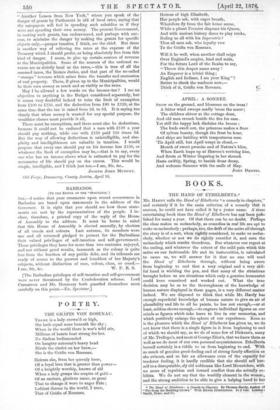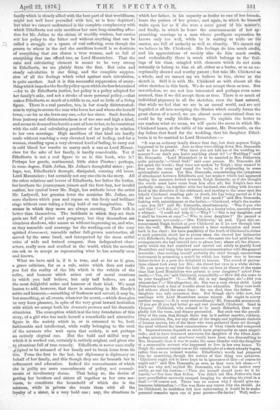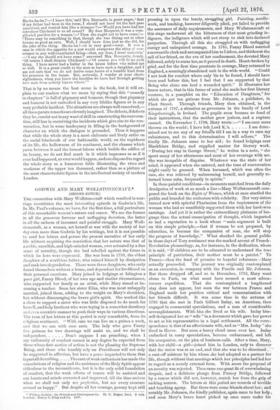BOOKS.
THE HAND OF ETHELBERTA.*
Mu. HARDY calls the Hand of Ethelberta "a comedy in chapters," and certainly if it be the main criterion of a comedy that it amuses, he could not have called it by a juster name. A! chore entertaining book than the Hand of Ethelberta has not been pub- lished for many a year. Of that there can be no doubt. Perhaps the close makes us melancholy, as comedies in real life are apt to make us melancholy ; perhaps, too, the drift of the satire all through the story is of a sort, when rightly considered, to make us melan- choly, whether or not we do rightly consider it, and earn the melancholy which results therefrom. But whatever our regret at the ending, and whatever the extent of the mild pain which this satire on our fashionable life and its insincerities, is calculated to cause us, we will answer for it that no one will read the Hand of Ethelberta through, without being aware from beginning to end that a very original and a very skil- ful hand is wielding the pen, and that many of the situations brought before us are situations which only a genuine humourist could have conceived and worked out. What the true decision may be as to the thoroughness of the knowledge of human nature displayed in these pages, is a very different matter indeed. We are disposed to think that while Mr. Hardy has enough superficial knowledge of human nature to give an air of plausibility and life to all he paints, he has not enough,—or at least, seldom shows enough,—to engrave individual figures on our minds as figures which take leave to live in our memories, and which positively enlarge the sphere of our experience. Keen as is the pleasure which the Hand of Ethelberta has given us, we do not know that there is a single figure in it from beginning to end of which we should say, as we do of some few of Dickens's, many of Mr. Trollope's, and most of George Eliot's, that we know.them as well as we do most of our own personal acquaintances. Ethelberta herself certainly is a riddle to us from beginning to end. With so much of genuine good-feeling and of strong family affection as she evinces, and so fair an allowance even of the capacity for tenderer feeling, it is hardly credible that she should sell her- self to a disreputable, sly old nobleman like Lord Mountclere, with no more of repulsion and inward conflict than she actually ex- hibits. We do not say that the worldly element in the woman, and the strong ambition to be able to give a helping hand to her * The Hand of Ethelberta; a Comedy in Chapters. By Thomas Hardy, Author of "Far from the Madding Crowd." With Eleven Illustrations. In 2 vole. London; Smith, Elder, and Co. family which is closely allied with the best part of that worldliness, might not well have prevailed with her, as is here depicted ; but what we cannot understand is the complete complacency with which Ethelberta not only sacrifices her own long-standing affec- tion for Mr. Julian to the claims of worldly wisdom, but carries out her policy to the bitter end without anything that can be called a struggle or a spasm of real suffering, even though the person to whom in the end she sacrifices herself is so destitute of everything that can charm a true woman, and so full of everything that can offend one, as Lord Mountclere. That the calm and calculating element is meant to be very strong in Ethelberta, we see plainly from the first. But calm and steady calculation is one thing, and the complete suppres- sion of all the feelings which rebel against such calculation, is quite another. And it is this successful suppression of every- thingwhich impedes the family policy upon which she has determined —for to do Ethelberta justice, her policy is a policy adopted for her family's sake, and not a stroke of mere personal policy,—that makes Ethelberta so much of a riddle to us, and so little of a living figure. There is a real paradox, too, in her steady disinterested- ness in trying to secure the man who loves her and whom she herself loves,—so far as she loves any one,—for her sister. Such freedom from jealousy and disinterestedness is of too rare and high a kind, and seems to demand too heroic a sort of love in her, to be consistent with the cold and calculating prudence of her policy in relation to her own marriage. High sacrifices of that kind are hardly made without reaching a very elevated level of feeling, and for a woman, standing upon a very elevated level of feeling, to carry out in cold blood her resolve to marry such a one as Lord Mount- clere for the sake of her family, is hardly conceivable. Yet if Ethelberta is not a real figure to us in this book, who is ? Perhaps her gentle, sentimental, little sister Picotee ; perhaps, in some degree, Faith Julian, Mr. Julian's thoughtful sister ; per- haps, too, Ethelberta's decrepit, dissipated, cunning old lover, Lord Mountclere ; but certainly not any one else in the story. All the other relatives and lovers of Ethelberta, her father the butler, her brothers the journeymen joiners and the foot-boy, her invalid mother, her cynical lover Mr. Neigh, her aesthetic lover the artist Mr. Ladywell, her genuine lover the musician •Mr. Julian, are mere shadows which pass and repass on this lively and brilliant stage without once taking a living hold of our imagination. The scenes in which they move are always amusing. Their talk is better than themselves. The incidents in which they act their parts are full of point and pungency, but they themselves are vivacious shadows, who amuse us without impressing us, and who, as they assemble and converge for the working-out of the very spirited dinouement, resemble rather full-grown marionettes, all moved by the same hand, and interpreted by the same artful voice of wide and trained compass, than independent char- acters, really seen and studied in the world, which the novelist can ask us to accept as representing what he has actually seen and known.
What we have said is, if it is true, and so far as it goes, a grave criticism, for as a rule, satire which does not make you feel the reality of the life which is the vehicle of the satire, and humour which arises out of moral creations in which you half believe, but only half believe, are not the most delightful satire and humour of their kind. We must hasten to add, however, that there is something in Mr. Hardy's satire and humour,—something of freshness and naiveté, it may be, but something, at all events, whatever its secret,—which does give us very keen pleasure, in spite of the very great invtard hesitation with which we accept both his dramatis persona; and his dramatic situations. The conception which is at the very foundation of this story, of a girl who has made herself a remarkable and attractive figure in the society which is, or is esteemed to be, both fashionable and intellectual, while really belonging to the rank of the servants who wait upon that society, is not perhaps an entirely oirginal one. But the bold and skilful way in which it is worked out, certainly is entirely original, and gives rise to situations full of true comedy. Ethelberta is never once really eppted to be ashamed of her family and to break loose from its ties. From the first to the last, her diplomacy is diplomacy on behalf of her family, and this though they are far beneath her in refinement and education. Indeed the concealments of which she is guilty are mere concealments of policy, not conceal- ments of involuntary shame. That being so, the device of getting her brothers and sisters all together as her own ser- vants, to constitute the household of which she is the mistress, while in private she treats them with all the loyalty of a sister, is a very bold one ; nay, the situations in
which her father, in his capacity as butler to one of her friends, hears the praises of her poems, and again, in which he himself waits upon her as if she were a mere guest of his master's, and finally, in which he hears the announcement of her ap- proaching marriage to a man whose profligate reputation he knows only too well, while he is waiting at table on his master, are full of audacity as well as vivacity. We cannot say we believe in Mr. Chickerel. His feelings do him much credit, and his appreciations of society also do him much credit, and undoubtedly there is much which belongs to the feel- ings of his class, mingled with elements which do not seem naturally to belong to him at all, either as a butler, or as an ex- ceptionally shrewd and worthy parent ; but take Mr. Chickerel as a whole, and we cannot say we believe in him, clever as the sketch is. Still it is with Mr. Chickerel as with almost all the other sketches in this book. We do not accept them as true. But nevertheless, we are not less interested and perhaps even more amused, than if we did accept them as true. There is so much of individual piquancy in all the sketches, even the least natural, that while we feel that we are in an' unreal world, and are not beguiled at all into accepting the illusion which usually forms the great charm of a novel, we are almost more entertained than we could be by really lifelike figures. To explain the better to our readers what we mean, we will quote the scene in which Mr. Chickerel hears, at the table of his master, Mr. Doncastle, on the day before that fixed for the wedding, that his daughter Ethel- berta is to be married to Lord Mountclere :—
" It was an ordinary family dinner that day, but their nephew Neigh happened to be present. Just as they were sitting down Mrs. Donoastle said to hor husband ' Why have you not told me of the wedding to-
morrow 7—or don't you know anything about it? Wedding said Mr. Doncastle. 'Lord Mountclere is to be married to Mrs. Petherwin quite privately.'—' Good God ! ' said some person. Mr. Doncastle did not speak the words ; they were not spoken by Neigh ; they seemed to float over the room and round the walls, as if originating in some spiritualistic source. Yet Mrs. Doncastle, remembering the symptoms of attachment between Ethelberta and her nephew which had appeared daring the summer, looked towards Neigh instantly, as if she thought the words must have come from him after all; but Neigh's face was perfectly calm ; he, together with her husband, was sitting with his eyes fixed in the direction of the sideboard, and turning to the some spot she beheld Chickerel standing pale as death, his lips being parted as if he did not know where ho was. 'Did you speak 7 ' said Mrs. Doncastle, looking with astonishment at the butler.—' Chickerel, what's the matter —are you ill 7 ' said Mr. Doncastle, simultaneously. ' Was it you who
said that ? I did, air,' said Chickerel, in a husky voice, scarcely above a whisper. 'I could not help Why?'—' She is my daughter, and
it shall be known at once Who is your daughter 7' He paused a few momenta nervously.—' Mrs. Petherwin,' be said. Upon this an- nouncement Neigh looked at poor Chickerel as if he saw through him into the wall. Mrs. Doncastle uttered a faint exclamation and leant back in her chair : the bare possibility of the truth of Chickerel's claims to such paternity shook her to pieces when she viewed her intimacies with Ethelberta daring the past season—the court she had paid her, the arrangements she had entered into to please her; above all, the dinner- party which she had contrived and carried out solely to gratify Lord Mountelere and bring him into personal communication with the general favourite ; thus making herself probably the chief though unconscious instrument in promoting a match by which her butler was to become father-in-law to a peer she delighted to honour. The crowd of percep- tions almost took away hor life ; she closed her eyes in a white shiver.
Do you mean to say that the lady who sat here at dinner at the same time that Lord Mountelere was present is your daughter ?' asked Don- castle.—' Yes, air,' said Chickerel, respectfully.—' How did she come to be your daughter?' I—Well, she is my daughter, sir.'—Did you educate her ?'—' Not altogether, sir. She was a very clever child. Lady Petherwin took a deal of trouble about her education. They wore both left widows about the same Limo : the son died, then the father. My daughter was only seventeen then. But though she's older now, her marriage with Lord Mountclere means misery. He ought to marry another woman.'—' It is very extraordinary,' Mr. Doncastle murmured. ' If you are ill you had better go and rest yourself, Chickerel. Send in Thomas.' Chickerel, who seemed to bo much disturbed, then very gladly loft the room, and dinner proceeded. But such was the peculi- arity of the case, thakthongh there was in it neither murder, robbery, illness, accident, fire, nor any other of the tragic and legitimate shakers of human nerves, two of the three who were gathered there sat through the meal without the least consciousness of what viands had composed it. Impressiveness depends as much upon propinquity as upon magni- tude; and to have honoured unawares the daughter of the vilest Anti- podean miscreant and murderer would have been less discomfiting to Mrs. Doncastle than it was to make the same blunder with the daughter of a respectable servant who happened to live in her own house. To Neigh the announcement was as the catastrophe of a story already begun, rather than as an isolated wonder. Ethelberta's words had prepared him for something, though the nature of that thing was unknown.
Chickerel ought not to have kept us in ignorance of this—of course he ought not!' said Mrs. Doncastle, as soon as they were left alone.—' I don't see why not,' replied Mr. Doncastle, who took the matter very coolly, as was his custom.—' Then she herself should have let it be known.'—' Nor does that fo7low. You didn't tell Mrs. Pethorwin that your grandfather narrowly escaped banging for shooting his,rival in a duel.'—' Of course not. There was no reason why I should give ex- traneous information.'—' Nor was there any reason why she should. As for Chickerel, he doubtless felt how unbecoming it would be to make personal remarks upon one of your guests—Ha-ha-ha I Well, well- Ba-ha-ha-har—'I know this,' said Mrs. Doncastle in great anger,' that if my father had been in the room, I should not have let the fact pass unnoticed, and treated him like a stranger !'—' Would you have had her introduce Chickerel to us all round? My dear Margaret, it was a com- plicated position for a woman.'—' Then she ought not to have come.'— 'There may be something in that, though she was dining out at other houses as good as ours. Well, I should have done just as she did, for the joke of the thing. Ha-ha-ha !—it is very good—very. It was a case in which the appetite for a jest would overpower the sting of con- science in any well-constituted being—that, my dear, I must maintain.' =I say she should not have come r answered Mrs. Doncastlo, firmly. 'Of course I shall, dismiss ChickereL'—' Of course you will do no such thing. I have never had a butler in the house before who suited me so welL It is a great credit to the man to have such a daughter, and I am not sure that we do not derive some lustre of a humble kind from his presence in the house. But, seriously, I wonder at your short- sightedness, when you know the troubles we have had through getting new men from nobody knows where.' " That is by no means the best scene in the book, but it will ex- plain to our readers what we mean by saying that this "comedy in chapters " is full of piquancy and humour, though that piquancy and humour is not embodied in any very lifelike figures or in any very probable incident. The situations are always well conceived,— all the separate remarks are cleverly imagined. The defects, if defects they be, consist not in any want of skill in constructing the conversa- tion, still less in contriving the incidents which give rise to the con- versation, but in some inadequacy in filling-in the background of character on which the dialogue is grounded. Thus it happens that while the whole story is a most elaborate and lively satire on the social falsehoods of our fashionable world, on the vapidness of its life, the hollowness of its sentiment, and the chasms which yawn between it and the honest labour which builds the edifice of its luxury, we do not find much in it which impresses us as if it ever had happened, or ever would happen, and are disposed to regard the whole story as a humorous fable illustrating the vices and weakness of the upper ten thousand, rather than as a picture of the most characteristic figures in the intellectual society of modern London.
































 Previous page
Previous page